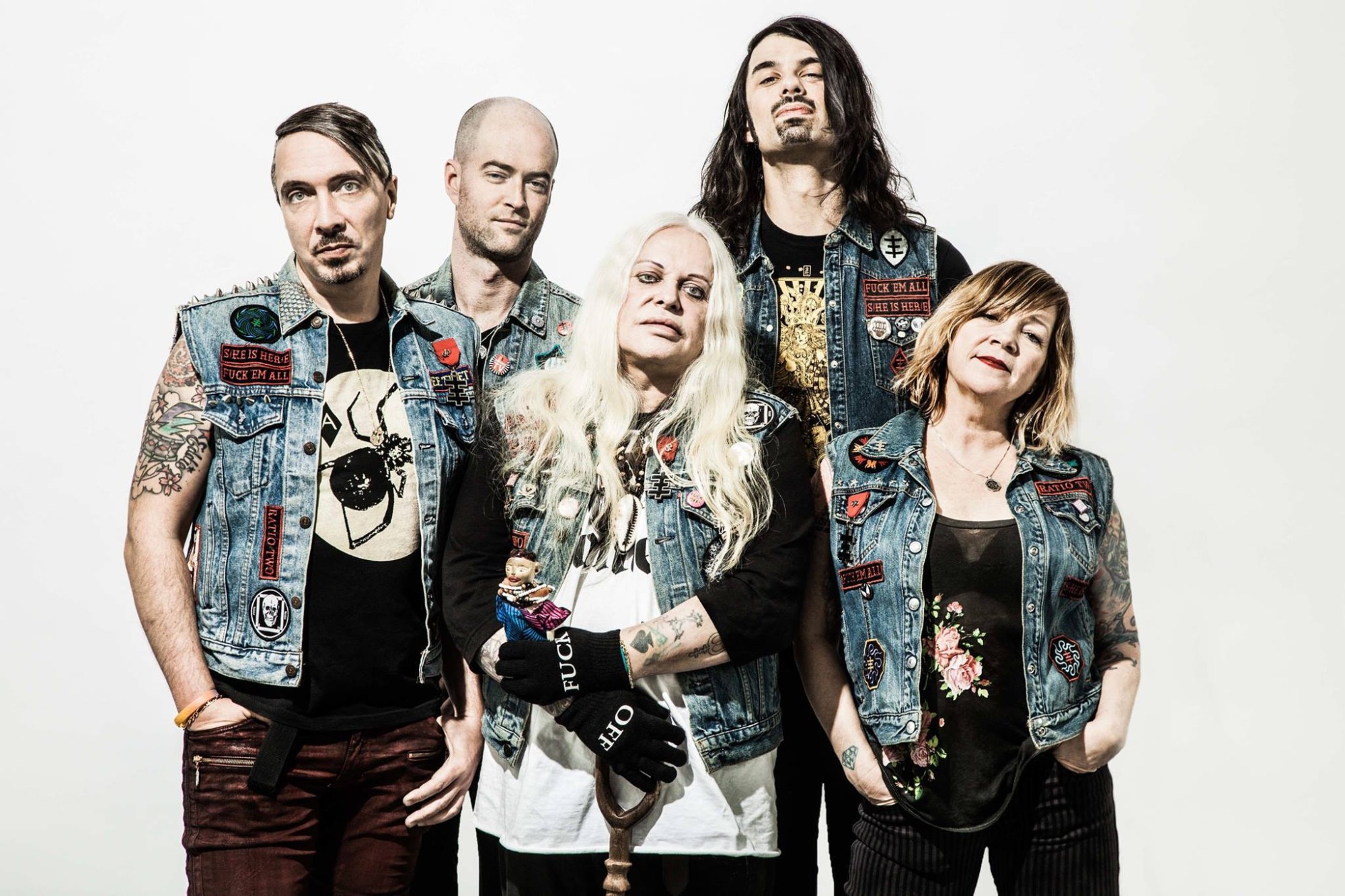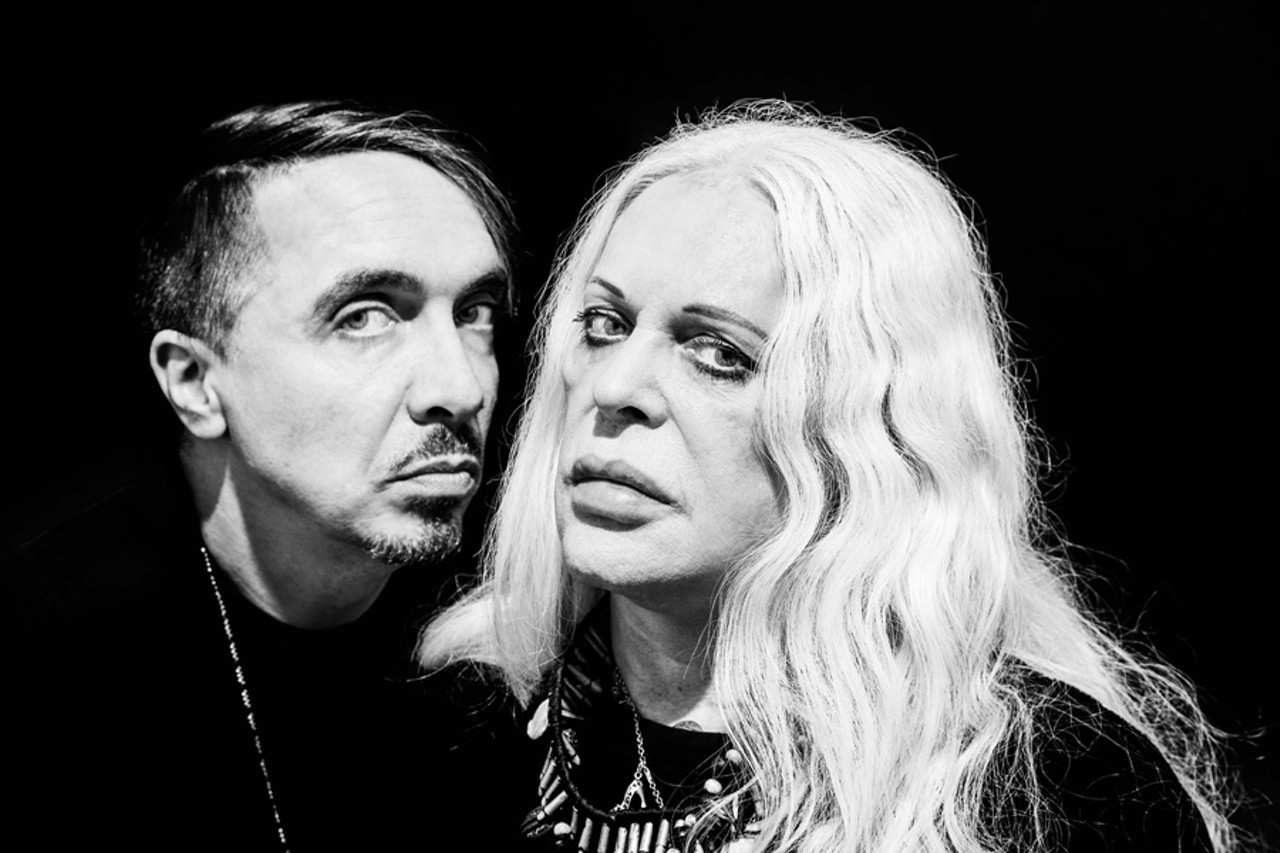On Saturday night, the pews were packed at the Church of the Holy Family in New York City. It wasn’t a religious ceremony, although it could have been. It was a fundraising event for A Message from The Temple, the forthcoming documentary about Thee Temple ov Psychick Youth, an occult group co-founded by Psychic TV singer Genesis Breyer P-Orridge, who sat onstage under an image of the psychic cross projected onto the altar.
The English artist, musician, and occultist best known for fronting iconoclastic British art collective COUM Transmissions and the pioneering industrial band Throbbing Gristle before co-founding Psychic TV, just added another talent to the mix — documentary subject.
Just as P-Orridge was recently featured on The Bight of the Twin, which followed the artist’s foray into Voudoun culture in Benin, there is another documentary in the works also about COUM Transmission.
“So, suddenly we’ve become a documentary factory, it’s weird being me,” says P-Orridge, who refers to themselves in plural since co-founding the Pandrogyne Project with their late wife and creative partner Lady Jaye Breyer P-Orridge, who died of stomach cancer in 2007. “What is there to lose? If it seems useful or interesting, share it; there’s so much banal and dull in the world.”
P-Orridge explains that the Catholic monks at the church this weekend got worried when they started screening the old Channel 4 clips about TOPY, which incorrectly claimed they were Satanists.
“They thought the videos were real, but once they heard me talk about generosity, compassion, sharing, and forgiveness, they realized that’s not what we are at all,” P-Orridge explains. Flashback to 1992: their home was raided by authorities after seeing a documentary about the group which was aired on Channel 4, but left the country for New York City after being improperly accused of child abuse. After this was disproved, as there was no evidence, Channel 4 retracted its allegations.
Even 30 years later, P-Orridge still finds the show hard to watch. “Didn’t anybody check the facts?” they ask. “They never actually spoke to a single person who had been in TOPY. It was so outrageous, an hour long program attacking people’s way of life.”

The story of TOPY hasn’t been fully told, which is partly why this documentary is in the works. Directed by Jacqueline Castel, who has previously curated P-Orridge’s work for a retrospective at the Tate Modern, the film features interviews with several members of the group which started in 1981 as an outpouring of the Psychic TV fanbase.
“We had a band with a cult following, we thought what if we take that more seriously?” asked P-Orridge. “We looked at the back of 12″ records, which had pictures of the band, but there was so much space, so we wrote essays and told people how we feel about the world.”
They accompanied the essays with contact information, saying if their words resonated to please get in touch. “To our satisfaction, people did,” P-Orridge explains. “The more people got in touch, the more we developed it.” So the TOPY grew from its UK base to having chapters on several continents and was run by individual members in each city. “It was the last energized, dynamic network that used the mail. We had to write letters, Xerox booklets; there was no internet or cell phones.”
But because of their ties to the occult, they were often misunderstood. “It’s always that way. When something has power and the energy is creating change, the people who have a vested interest in things being the same always try and make up false stories to try and alienate people from that power.”
The group halted in 2008 but P-Orridge insists that it’s still there. “It stopped as a formal network because there was no way to carry on without it becoming a sort of power pyramid, and we didn’t want that.” But making it less formal could have been a good thing, as it has become a sort of family. “We still believe you might have a blood family with your parents and siblings but sometimes that’s the last family you want to be part of,” P-Orridge says. “We feel everyone has a right to choose their own family or recognize their own chosen family.”
Often, P-Orridge will stand onstage at concerts, as they did this summer at the Astra Club in Berlin, and tell everyone to turn to the person beside them and give them a hug. It’s a reflection of TOPY’s spirit, which encouraged helping others and being prepared to sacrifice to take care of each other. These simple but true things could be needed more now than ever, especially in the age of social media.

“We’re living in a world where we have social media and people have agreed with each other that they’re connected, but they’re disconnected,” P-Orridge explained. “In a world where it’s becoming more isolated and self-centered, more narcissistic, and more obsessed with self, things like generosity, sharing, and forgiveness become a radical act.”
Even though the TOPY group was not a religion, it had some of the markings of one. Thee Psychick Bible was published in 2010, which is culled from hundreds of newsletters, group actions, and letters between members; the psychic cross is a symbol that unified an invisible tribe of people. “It still represents the individual choosing of who you want to donate your love, generosity, time, and ideals with and that’s rarely who you are related to by blood,” P-Orridge says.
It has been 34 years since the release of Psychic TV’s first album, 1982’s Force the Hand of Chance, which was reissued by Angry Love this summer. The band is on tour through December, promoting its new album Alienist, which features only four songs, two of which are covers: Creation’s “How Does It Feel to Feel” and Harry Nilsson’s “Jump into the Fire.” P-Orridge met Nilsson through Timothy Leary and felt he needed to be remembered. “We were thinking about the word ‘alienist’; it could mean psychologist, detective, or extra-terrestrials,” says P-Orridge. “We’re fascinated by words with multiple meanings that can contradict themselves.”
The two new songs were improvised without rehearsals in the studio. “It took one night to record, two nights to mix — old style,” says P-Orridge. “It all happened with our instinct in the moment.” P-Orridge is widely recognized as a source of wisdom, which includes offering advice to young musicians. “Try and decide what you really want to say — do you really have something to say or do you just want to be rich and famous?” they ask.
“If what you want to do is stretch things and do something unique, don’t think ‘how weird can I make it,’ think ‘how pure and true to me can I make it?’ and do it regardless of anyone’s opinion,” they say. “You’ll find 45 years later, you’re still in a band.”
Psychic TV plays Shepherd’s Bush Empire in London on November 7.
Credits
Text Nadja Sayej
